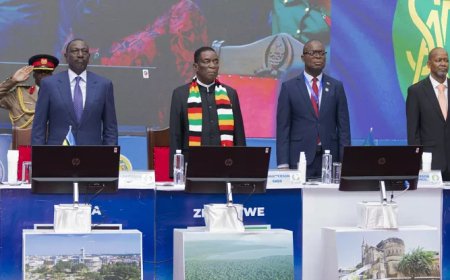U.S. Gold Card: A Game-Changer for African Investors?
If implemented, this initiative could be transformative for African entrepreneurs seeking international expansion, business stability, and financial benefits.

The proposed U.S. Gold Card is generating global debate, offering wealthy investors a pathway to U.S. citizenship with significant tax advantages. If implemented, this initiative could be transformative for African entrepreneurs seeking international expansion, business stability, and financial benefits.
In an exclusive discussion with international immigration lawyer Reaz Jafri, we explored the potential impact of the U.S. Gold Card on African investors and governments:
-
Opportunities for African Investors: The program could provide African business leaders with greater access to global markets, favorable tax policies, and a more stable economic environment for growth and diversification.
-
Lessons for African Governments: African nations could learn from this model to design competitive residency or citizenship programs that attract foreign investment, foster entrepreneurship, and boost economic development.
-
The Future of Investment Migration: Should African countries introduce similar initiatives to draw global investors? With well-structured policies, such programs could strengthen local economies, drive innovation, and create job opportunities for citizens.
As discussions around the U.S. Gold Card continue, the potential ripple effects on global investment migration trends remain a topic of keen interest.
Kenya’s small and medium-sized enterprises (SMEs) are the driving force behind the nation’s economy, accounting for 99% of businesses and employing approximately 75% of the workforce. The ongoing digital revolution is transforming how these enterprises operate, opening up new avenues for growth, efficiency, and collaboration with larger corporations.
With increasing internet penetration and mobile technology adoption, Kenyan SMEs are leveraging digital platforms for e-commerce, financial services, and supply chain management. This shift is not only enhancing business efficiency but also creating new job opportunities and fostering economic resilience in an evolving global marketplace.
As more businesses embrace digital transformation, stakeholders are calling for policies that support digital infrastructure, cybersecurity, and access to funding, ensuring sustainable growth for the SME sector.
A culinary transformation is taking shape in Addis Ababa as Syrian refugees bring their rich and aromatic cuisine to Ethiopia. This blending of Middle Eastern and East African flavors is introducing Ethiopian diners to new tastes, enriching the local food scene with affordable and delicious options.
Beyond the flavors, the rise of Syrian cuisine in Ethiopia symbolizes resilience, cultural exchange, and economic opportunity. Many Syrian refugees, faced with the challenge of rebuilding their lives, have turned to their culinary traditions as a means of livelihood. Their food businesses are not only thriving but also fostering deeper cultural connections between the two communities.
With increasing interest in global cuisine, Ethiopian food lovers are embracing this fusion, showcasing how migration can lead to innovative culinary experiences and mutual cultural appreciation.
What's Your Reaction?
 Like
0
Like
0
 Dislike
0
Dislike
0
 Love
0
Love
0
 Funny
0
Funny
0
 Angry
0
Angry
0
 Sad
0
Sad
0
 Wow
0
Wow
0
















